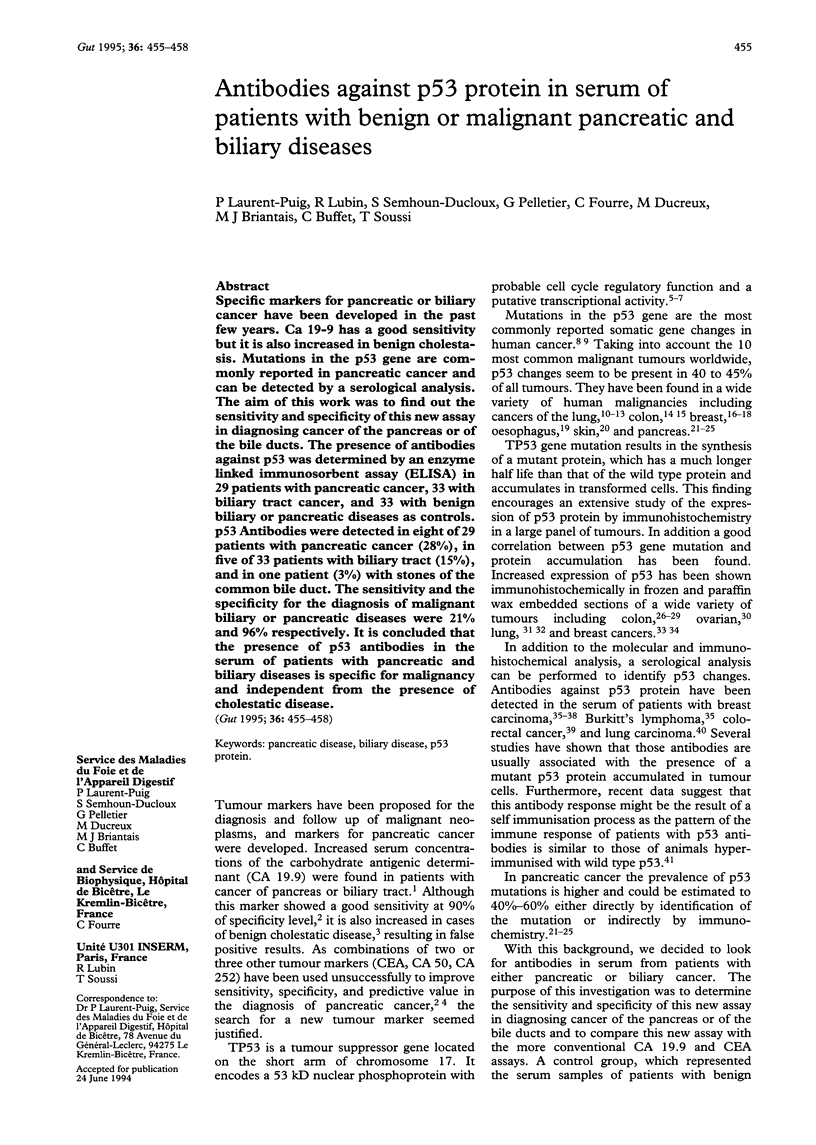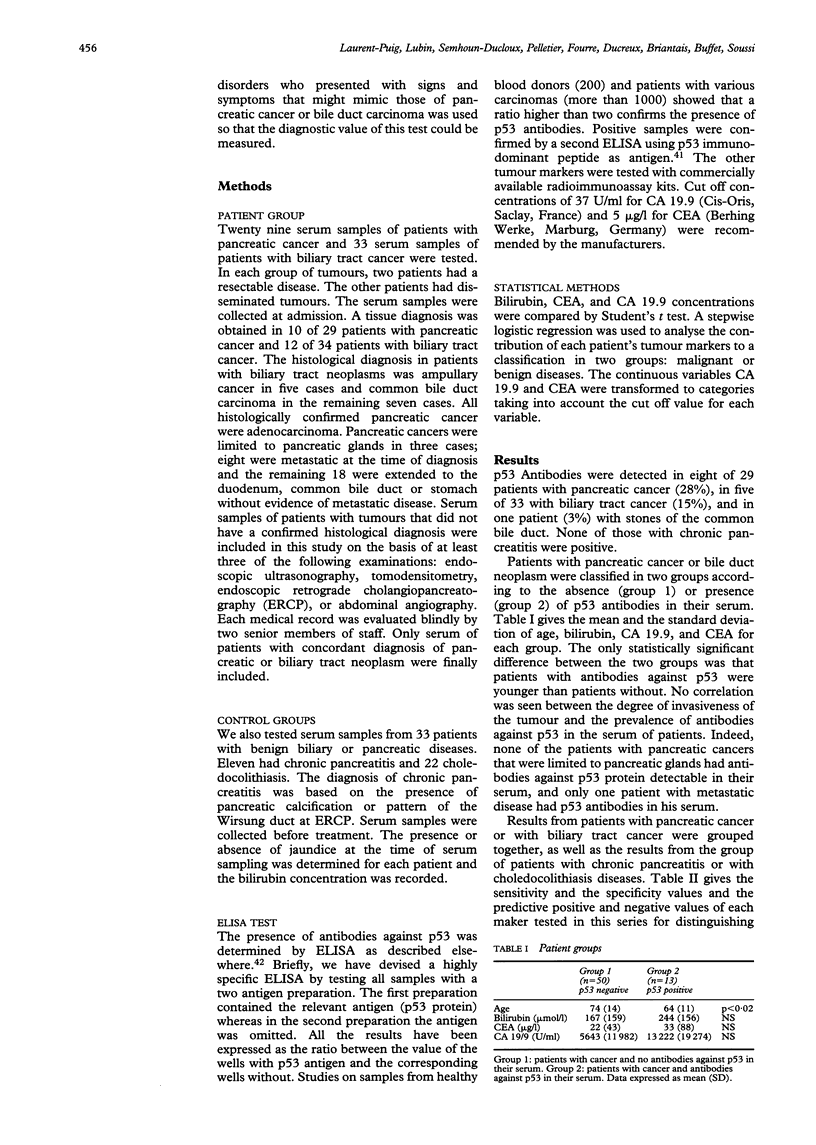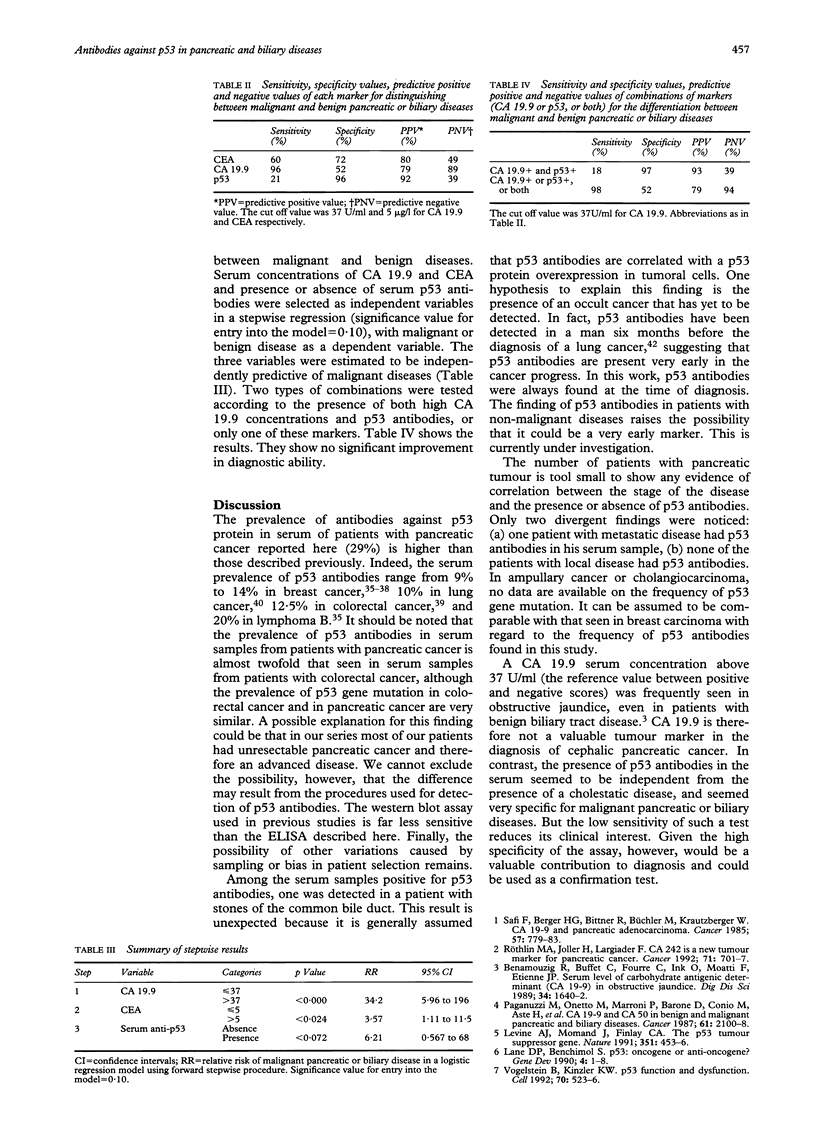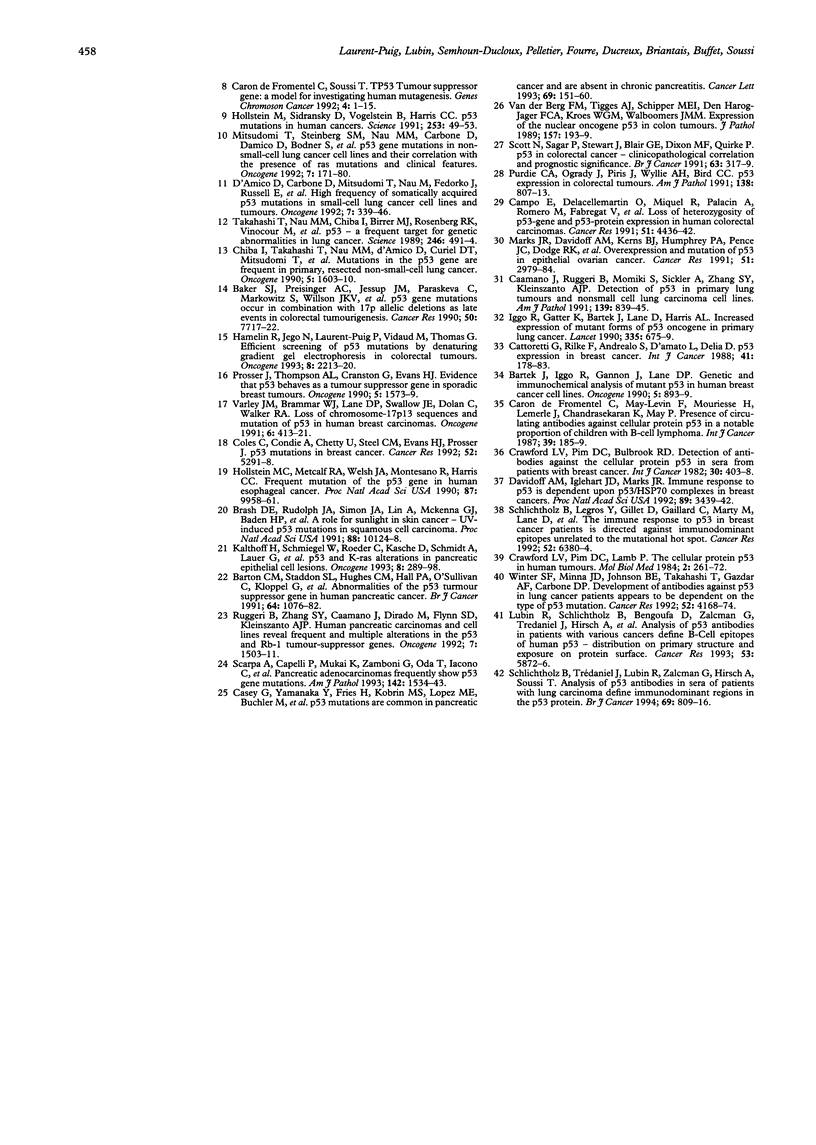Abstract
Specific markers for pancreatic or biliary cancer have been developed in the past few years. Ca 19-9 has a good sensitivity but it is also increased in benign cholestasis. Mutations in the p53 gene are commonly reported in pancreatic cancer and can be detected by a serological analysis. The aim of this work was to find out the sensitivity and specificity of this new assay in diagnosing cancer of the pancreas or of the bile ducts. The presence of antibodies against p53 was determined by an enzyme linked immunosorbent assay (ELISA) in 29 patients with pancreatic cancer, 33 with biliary tract cancer, and 33 with benign biliary or pancreatic diseases as controls. p53 Antibodies were detected in eight of 29 patients with pancreatic cancer (28%), in five of 33 patients with biliary tract (15%), and in one patient (3%) with stones of the common bile duct. The sensitivity and the specificity for the diagnosis of malignant biliary or pancreatic diseases were 21% and 96% respectively. It is concluded that the presence of p53 antibodies in the serum of patients with pancreatic and biliary diseases is specific for malignancy and independent from the presence of cholestatic disease.
Full text
PDF



Selected References
These references are in PubMed. This may not be the complete list of references from this article.
- Baker S. J., Preisinger A. C., Jessup J. M., Paraskeva C., Markowitz S., Willson J. K., Hamilton S., Vogelstein B. p53 gene mutations occur in combination with 17p allelic deletions as late events in colorectal tumorigenesis. Cancer Res. 1990 Dec 1;50(23):7717–7722. [PubMed] [Google Scholar]
- Bartek J., Iggo R., Gannon J., Lane D. P. Genetic and immunochemical analysis of mutant p53 in human breast cancer cell lines. Oncogene. 1990 Jun;5(6):893–899. [PubMed] [Google Scholar]
- Barton C. M., Staddon S. L., Hughes C. M., Hall P. A., O'Sullivan C., Klöppel G., Theis B., Russell R. C., Neoptolemos J., Williamson R. C. Abnormalities of the p53 tumour suppressor gene in human pancreatic cancer. Br J Cancer. 1991 Dec;64(6):1076–1082. doi: 10.1038/bjc.1991.467. [DOI] [PMC free article] [PubMed] [Google Scholar]
- Caamano J., Ruggeri B., Momiki S., Sickler A., Zhang S. Y., Klein-Szanto A. J. Detection of p53 in primary lung tumors and nonsmall cell lung carcinoma cell lines. Am J Pathol. 1991 Oct;139(4):839–845. [PMC free article] [PubMed] [Google Scholar]
- Campo E., de la Calle-Martin O., Miquel R., Palacin A., Romero M., Fabregat V., Vives J., Cardesa A., Yague J. Loss of heterozygosity of p53 gene and p53 protein expression in human colorectal carcinomas. Cancer Res. 1991 Aug 15;51(16):4436–4442. [PubMed] [Google Scholar]
- Caron de Fromentel C., May-Levin F., Mouriesse H., Lemerle J., Chandrasekaran K., May P. Presence of circulating antibodies against cellular protein p53 in a notable proportion of children with B-cell lymphoma. Int J Cancer. 1987 Feb 15;39(2):185–189. doi: 10.1002/ijc.2910390211. [DOI] [PubMed] [Google Scholar]
- Caron de Fromentel C., Soussi T. TP53 tumor suppressor gene: a model for investigating human mutagenesis. Genes Chromosomes Cancer. 1992 Jan;4(1):1–15. doi: 10.1002/gcc.2870040102. [DOI] [PubMed] [Google Scholar]
- Casey G., Yamanaka Y., Friess H., Kobrin M. S., Lopez M. E., Buchler M., Beger H. G., Korc M. p53 mutations are common in pancreatic cancer and are absent in chronic pancreatitis. Cancer Lett. 1993 May 14;69(3):151–160. doi: 10.1016/0304-3835(93)90168-9. [DOI] [PubMed] [Google Scholar]
- Cattoretti G., Rilke F., Andreola S., D'Amato L., Delia D. P53 expression in breast cancer. Int J Cancer. 1988 Feb 15;41(2):178–183. doi: 10.1002/ijc.2910410204. [DOI] [PubMed] [Google Scholar]
- Chiba I., Takahashi T., Nau M. M., D'Amico D., Curiel D. T., Mitsudomi T., Buchhagen D. L., Carbone D., Piantadosi S., Koga H. Mutations in the p53 gene are frequent in primary, resected non-small cell lung cancer. Lung Cancer Study Group. Oncogene. 1990 Oct;5(10):1603–1610. [PubMed] [Google Scholar]
- Coles C., Condie A., Chetty U., Steel C. M., Evans H. J., Prosser J. p53 mutations in breast cancer. Cancer Res. 1992 Oct 1;52(19):5291–5298. [PubMed] [Google Scholar]
- Crawford L. V., Pim D. C., Bulbrook R. D. Detection of antibodies against the cellular protein p53 in sera from patients with breast cancer. Int J Cancer. 1982 Oct 15;30(4):403–408. doi: 10.1002/ijc.2910300404. [DOI] [PubMed] [Google Scholar]
- Crawford L. V., Pim D. C., Lamb P. The cellular protein p53 in human tumours. Mol Biol Med. 1984 Aug;2(4):261–272. [PubMed] [Google Scholar]
- D'Amico D., Carbone D., Mitsudomi T., Nau M., Fedorko J., Russell E., Johnson B., Buchhagen D., Bodner S., Phelps R. High frequency of somatically acquired p53 mutations in small-cell lung cancer cell lines and tumors. Oncogene. 1992 Feb;7(2):339–346. [PubMed] [Google Scholar]
- Davidoff A. M., Iglehart J. D., Marks J. R. Immune response to p53 is dependent upon p53/HSP70 complexes in breast cancers. Proc Natl Acad Sci U S A. 1992 Apr 15;89(8):3439–3442. doi: 10.1073/pnas.89.8.3439. [DOI] [PMC free article] [PubMed] [Google Scholar]
- Hamelin R., Jego N., Laurent-Puig P., Vidaud M., Thomas G. Efficient screening of p53 mutations by denaturing gradient gel electrophoresis in colorectal tumors. Oncogene. 1993 Aug;8(8):2213–2220. [PubMed] [Google Scholar]
- Hollstein M. C., Metcalf R. A., Welsh J. A., Montesano R., Harris C. C. Frequent mutation of the p53 gene in human esophageal cancer. Proc Natl Acad Sci U S A. 1990 Dec;87(24):9958–9961. doi: 10.1073/pnas.87.24.9958. [DOI] [PMC free article] [PubMed] [Google Scholar]
- Hollstein M., Sidransky D., Vogelstein B., Harris C. C. p53 mutations in human cancers. Science. 1991 Jul 5;253(5015):49–53. doi: 10.1126/science.1905840. [DOI] [PubMed] [Google Scholar]
- Iggo R., Gatter K., Bartek J., Lane D., Harris A. L. Increased expression of mutant forms of p53 oncogene in primary lung cancer. Lancet. 1990 Mar 24;335(8691):675–679. doi: 10.1016/0140-6736(90)90801-b. [DOI] [PubMed] [Google Scholar]
- Kalthoff H., Schmiegel W., Roeder C., Kasche D., Schmidt A., Lauer G., Thiele H. G., Honold G., Pantel K., Riethmüller G. p53 and K-RAS alterations in pancreatic epithelial cell lesions. Oncogene. 1993 Feb;8(2):289–298. [PubMed] [Google Scholar]
- Levine A. J., Momand J., Finlay C. A. The p53 tumour suppressor gene. Nature. 1991 Jun 6;351(6326):453–456. doi: 10.1038/351453a0. [DOI] [PubMed] [Google Scholar]
- Lubin R., Schlichtholz B., Bengoufa D., Zalcman G., Trédaniel J., Hirsch A., Caron de Fromentel C., Preudhomme C., Fenaux P., Fournier G. Analysis of p53 antibodies in patients with various cancers define B-cell epitopes of human p53: distribution on primary structure and exposure on protein surface. Cancer Res. 1993 Dec 15;53(24):5872–5876. [PubMed] [Google Scholar]
- Marks J. R., Davidoff A. M., Kerns B. J., Humphrey P. A., Pence J. C., Dodge R. K., Clarke-Pearson D. L., Iglehart J. D., Bast R. C., Jr, Berchuck A. Overexpression and mutation of p53 in epithelial ovarian cancer. Cancer Res. 1991 Jun 1;51(11):2979–2984. [PubMed] [Google Scholar]
- Mitsudomi T., Steinberg S. M., Nau M. M., Carbone D., D'Amico D., Bodner S., Oie H. K., Linnoila R. I., Mulshine J. L., Minna J. D. p53 gene mutations in non-small-cell lung cancer cell lines and their correlation with the presence of ras mutations and clinical features. Oncogene. 1992 Jan;7(1):171–180. [PubMed] [Google Scholar]
- Prosser J., Thompson A. M., Cranston G., Evans H. J. Evidence that p53 behaves as a tumour suppressor gene in sporadic breast tumours. Oncogene. 1990 Oct;5(10):1573–1579. [PubMed] [Google Scholar]
- Purdie C. A., O'Grady J., Piris J., Wyllie A. H., Bird C. C. p53 expression in colorectal tumors. Am J Pathol. 1991 Apr;138(4):807–813. [PMC free article] [PubMed] [Google Scholar]
- Ruggeri B., Zhang S. Y., Caamano J., DiRado M., Flynn S. D., Klein-Szanto A. J. Human pancreatic carcinomas and cell lines reveal frequent and multiple alterations in the p53 and Rb-1 tumor-suppressor genes. Oncogene. 1992 Aug;7(8):1503–1511. [PubMed] [Google Scholar]
- Röthlin M. A., Joller H., Largiadèr F. CA 242 is a new tumor marker for pancreatic cancer. Cancer. 1993 Feb 1;71(3):701–707. doi: 10.1002/1097-0142(19930201)71:3<701::aid-cncr2820710308>3.0.co;2-c. [DOI] [PubMed] [Google Scholar]
- Safi F., Beger H. G., Bittner R., Büchler M., Krautzberger W. CA 19-9 and pancreatic adenocarcinoma. Cancer. 1986 Feb 15;57(4):779–783. doi: 10.1002/1097-0142(19860215)57:4<779::aid-cncr2820570417>3.0.co;2-c. [DOI] [PubMed] [Google Scholar]
- Scarpa A., Capelli P., Mukai K., Zamboni G., Oda T., Iacono C., Hirohashi S. Pancreatic adenocarcinomas frequently show p53 gene mutations. Am J Pathol. 1993 May;142(5):1534–1543. [PMC free article] [PubMed] [Google Scholar]
- Schlichtholz B., Legros Y., Gillet D., Gaillard C., Marty M., Lane D., Calvo F., Soussi T. The immune response to p53 in breast cancer patients is directed against immunodominant epitopes unrelated to the mutational hot spot. Cancer Res. 1992 Nov 15;52(22):6380–6384. [PubMed] [Google Scholar]
- Schlichtholz B., Trédaniel J., Lubin R., Zalcman G., Hirsch A., Soussi T. Analyses of p53 antibodies in sera of patients with lung carcinoma define immunodominant regions in the p53 protein. Br J Cancer. 1994 May;69(5):809–816. doi: 10.1038/bjc.1994.159. [DOI] [PMC free article] [PubMed] [Google Scholar]
- Scott N., Sagar P., Stewart J., Blair G. E., Dixon M. F., Quirke P. p53 in colorectal cancer: clinicopathological correlation and prognostic significance. Br J Cancer. 1991 Feb;63(2):317–319. doi: 10.1038/bjc.1991.74. [DOI] [PMC free article] [PubMed] [Google Scholar]
- Takahashi T., Nau M. M., Chiba I., Birrer M. J., Rosenberg R. K., Vinocour M., Levitt M., Pass H., Gazdar A. F., Minna J. D. p53: a frequent target for genetic abnormalities in lung cancer. Science. 1989 Oct 27;246(4929):491–494. doi: 10.1126/science.2554494. [DOI] [PubMed] [Google Scholar]
- Varley J. M., Brammar W. J., Lane D. P., Swallow J. E., Dolan C., Walker R. A. Loss of chromosome 17p13 sequences and mutation of p53 in human breast carcinomas. Oncogene. 1991 Mar;6(3):413–421. [PubMed] [Google Scholar]
- Vogelstein B., Kinzler K. W. p53 function and dysfunction. Cell. 1992 Aug 21;70(4):523–526. doi: 10.1016/0092-8674(92)90421-8. [DOI] [PubMed] [Google Scholar]
- Winter S. F., Minna J. D., Johnson B. E., Takahashi T., Gazdar A. F., Carbone D. P. Development of antibodies against p53 in lung cancer patients appears to be dependent on the type of p53 mutation. Cancer Res. 1992 Aug 1;52(15):4168–4174. [PubMed] [Google Scholar]
- van den Berg F. M., Tigges A. J., Schipper M. E., den Hartog-Jager F. C., Kroes W. G., Walboomers J. M. Expression of the nuclear oncogene p53 in colon tumours. J Pathol. 1989 Mar;157(3):193–199. doi: 10.1002/path.1711570304. [DOI] [PubMed] [Google Scholar]


